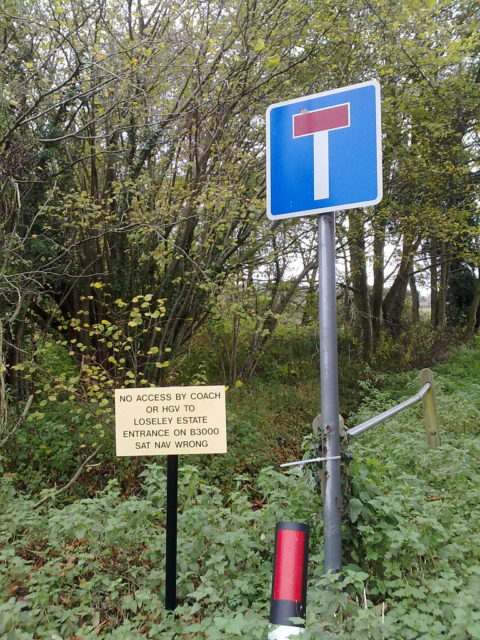In common with most people in this age of pandemic, I don’t travel very much these days. Back when I did manage to get out and about on the roads, I had an early Garmin GPS device in my vehicle and when I eventually updated the sound system in my truck to a new device, it included a built-in GPS (that constantly “loses” satellite fixes and loudly informs me, even when I’m not using the mapping function). I’ve had both good and bad experiences with these devices, but Alistair Dabbs is much more entertaining with his story:

“Sat Nav FAIL” by J-o-n-o is licensed under CC BY-SA 2.0
Turn left. Turn right. At the roundabout, take the fourth exit.
Nobody enjoys being told what to do all the time but in the case of Google Maps I will make an exception. What I like about it best is that I can ignore her directions – should dissent take my fancy – and she doesn’t get cross.
This is in sharp contrast with all the classic sat-navs I have ever used, including the one embedded permanently into my current vehicle. Not only does it have a penchant for taking me on pointlessly circuitous routes, the wrong way up one-way streets, and along shortcuts too narrow for a bicycle, it grows angrier by the second when I refuse its orders.
“Turn right, turn right, turn right, turn left,” it would yell at increasing volume, trying to browbeat me into making a U-turn. Well no, I don’t want to drive through that building site or weave between those ambulances and fire engines dealing with that overturned lorry. Can’t you take me on an alternative route?
“Recalculating …” it would bark like a sulking dalek, but never accomplishing such. “Recalculating … Recalculating …”
Clearly I am not the only reluctant motorist to have given up on traditional sat-navs: not a single ad for one of these has turned up in my Black Friday spam deluge this year. And good riddance. Of the £3m per minute spent by Brits on their Black Friday shopping, roughly £0 will be spent on in-car nags.
Google Maps is more chilled. It’s as if she has resigned herself to my penchant for taking the wrong exits and missing turns. This is a habit I acquired by trying too hard not to drive like my father, who would obey every instruction from his sat-nav with military immediacy. As soon as he heard the words “Turn left”, he’d turn hard on the steering wheel straight away and we’d find ourselves heading up someone’s front drive, into an underground office car park or across a pedestrianised shopping walkway.
Me, I prefer to wait a bit – maybe a bit too long. Google Maps doesn’t mind and gives me no grief. Perhaps she also recognises her own faults in occasionally trying to direct me to drive through bricked-up entrances and children’s playgrounds. “Pff, whatever,” she probably thinks. “He’s too thick to follow the normal route. Let’s try a longer one.”
The odd thing is that she talks to Mme D in a very different way. On her smartphone, Google Maps is, well, chatty.
While all I get is a functional “Turn left/right” or “In 300 metres take the slip-road,” Mme D is treated to a tirade of verbosity. “Move into the filter lane and turn left at the next traffic lights heading north-northwest into B3496 Lower High Street but keep to the right to avoid the turnoff, mind the pedestrian crossing and wave hello to the butcher on the corner …” it spews, one directive tumbling into the next in a single continuous description of the journey and all its finest details.






